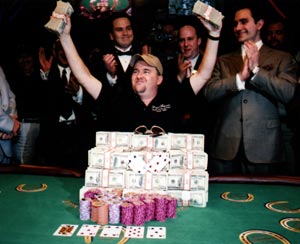
Chris Moneymaker won the World Series of Poker Main Event in 2003 — taking home the first prize of $2.5 million — from a $39 satellite tournament on PokerStars.com. Photo courtesy of pokernews.com.
In 2007, the height of the hold ‘em poker craze, the FBI’s cybercrime fraud unit warned Americans to stay away from online poker. The year prior had yielded nearly 9,000 players participating with a buy-in of $10,000 in the World Series of Poker Hold ‘Em main event — the first prize being approximately $12 million dollars.
Free online poker has been played since as early as the late 1990s, and has remained a compelling way for people to learn how to play “for real.” To widen their player circles, a common feature of internet poker sites is the availability of free satellite tournaments from which winners gain entry to larger pay tournaments.
In 2003, Chris Moneymaker changed the face of poker by winning a seat to the World Series in a $39 online satellite and going on to win champion of the main event – taking home $2.5 million. His day job at the time? Accountant.
That such a huge prize was won by an amateur player who had played almost exclusively online prior to the main tournament event was unheard of at the time. Suddenly the floodgates opened, and the 2004 World Series of Poker hosted three times as many players as in Moneymaker’s year. In fact, that year, the winner, Greg Raymer, had also won entry via an online satellite. During the next few years, more and more online participants were welcomed to the main event, several making it to the final table. The online poker industry’s “Big Three” (PokerStars, Full Tilt Poker, and Absolute Poker), all offshore companies, continued to prosper – then came the warning from the FBI.
But the band played on for four more years. Then, in 2011, the DOJ unsealed and hit the Big Three with indictments for wire fraud, money laundering, bank fraud, and operating in the U.S. in willful violation of the Unlawful Internet Gambling Enforcement Act (UIGEA), passed by Congress in 2006.
A few months after the indictments came out against PokerStars, et al, a woman named Virginia Seitz, then-U.S. Assistant Attorney General, changed the poker world yet again. Issuing an “opinion” from her post in DOJ’s Office of Legal Counsel, she wrote, in her 13-page document, that the Wire Act of 1961 did not in fact (in her opinion) prohibit all forms of online gaming. Up until that point, agencies had been cracking down on online gambling in the U.S. According to an August, 2014 article in Newsweek magazine, a few months after the release of Seitz’s document, the DOJ had settled all the charges, even allowing PokerStars to purchase Full Tilt — a company it had accused of the very offenses for which it claimed PokerStars was responsible for, in addition to defrauding its players.
With 16 state attorneys general behind him, Congressman Jason Chaffetz (R- Utah) has been working on legislation titled “Restoration of America’s Wire Act” for over a year. But, meanwhile, PokerStars picked up Full Tilt’s members and is going strong with more than 85 million players around the world, and there are hundreds of other successful sites out there. As a result of Seitz’s opinion, the DOJ has left online gamblers and gambling sites alone, leaving it up to states.
In May of 2013, Nevada became the first state to legalize online gambling, followed soon thereafter by Delaware and New Jersey. In an effort to generate greater revenues, Nevada and Delaware partnered to share player pools, allowing players from the two states to compete against each other. In the U.S., online poker players that live in or visit those three states can play legally on a variety of sites. Residents of states where it is not yet legal to play online poker, like New York, can still legally play in free satellite tournaments to live games. If Chris Moneymaker, Greg Raymer, and countless others are any indication, playing online is at least a means to become familiarized with the game – if not to win millions of dollars.
A list of all known poker sites can be found at www.pokerscout.com.
By Eugénie Bisulco eugenie@theforumnewsgroup.com
